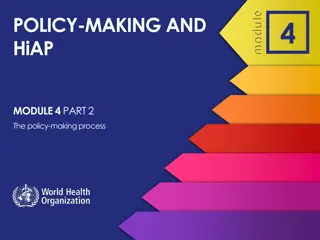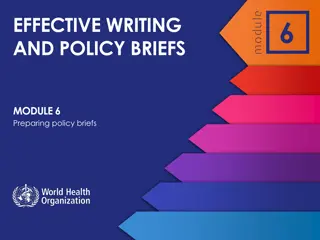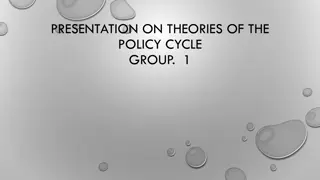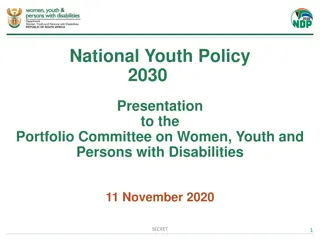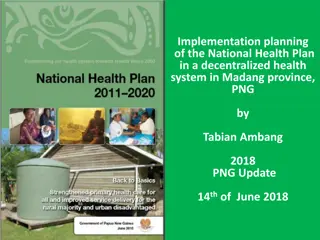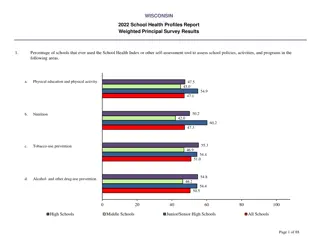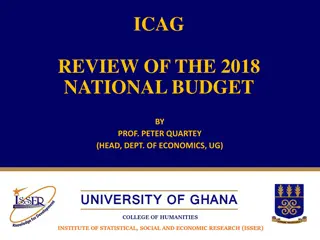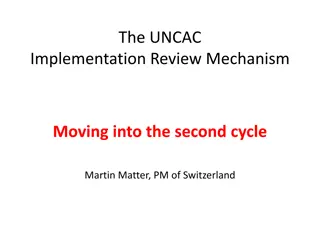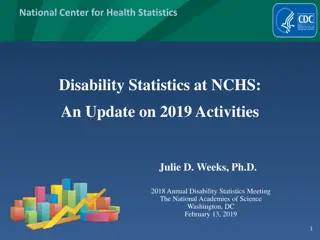Review of National Health Policy by Prof. A. Marthanda Pillai
Prof. A. Marthanda Pillai critically reviews the draft new national health policy, highlighting the need for clear objectives and increased health expenditure to address the rising burden of non-communicable diseases. The policy lacks direction in key areas like preventive care, health expenditure targets, and various healthcare initiatives. Pillai emphasizes the importance of monitoring fund utilization to ensure effective healthcare delivery.
Download Presentation

Please find below an Image/Link to download the presentation.
The content on the website is provided AS IS for your information and personal use only. It may not be sold, licensed, or shared on other websites without obtaining consent from the author. Download presentation by click this link. If you encounter any issues during the download, it is possible that the publisher has removed the file from their server.
E N D
Presentation Transcript
National health policy- A critical review Prof (Dr.) A Marthanda Pillai National President, IMA
National health policy-A critical review Now 13 years after the last National Health Policy, the Ministry of Health has brought out a draft new national health policy, which is in the public domain for discussions. The National Health Policy of 1983 and the National Health Policy of 2002 have served us well, in guiding the approach for the health sector in the Five-Year Plans and for different schemes.
National health policy-A critical review Development of a more robust, effective and credible new national health policy will give direction and coherence to our efforts further to improve health of the nation. IMA congratulate the government in bringing out a policy within few months of assuming power. However the policy lacks clear directions and more importantly time bound targets or objectives in achieving different health parameters.
National health policy-A critical review The policy, should give greater focus for preventive and rehabilitative care in the context of rising burden of non- communicable diseases. The policy has a reluctant and hesitant approach towards enhancing health expenditure - a mere increase to 2.5% of GDP is being proposed whereas the policy itself acknowledges that only if the Government starts to spend 4 to 5% of GDP, a real impact can be made in the health sector.
National health policy-A critical review It is almost silent on many things including strengthening the family welfare program, improving medical education, school health education, programmes for health of the elderly, mental health, four tier system of health care, family doctor concept, health manpower assessment, improving overall efficiency of health management, addressing intra state and inter state disparities and system for monitoring and expenditure tracking.
National health policy-A critical review A large part of allocation of funds is spent on pay and allowances, pensions, transport and establishments. Funds for actual expenditure on health and medical care needs to be more specified and spent only on designated purpose. There should be a permanent mechanism to monitor the utilization of funds and to ensure that funds reach the targeted population with the intended purpose. .
There is need for inculcating better managerial skills; Indian Medical Service just like the IAS, IRS
National health policy-A critical review STRENGTHENING SMALL AND MEDIUM LEVEL HOSPITALS Majority of health care in the country is still delivered by small-scale institutions, and these small players move the national health indices, however Government policy seems to ignorethe sector and giving undue importance to corporate sector. The policy even states that small scale institutions have to be brought under the corporate hospitals in the pretext of ensuring uniform standard of health care.
National health policy-A critical review Government policy should aim at sustaining and promoting these own- account-enterprises (OAEs) so that affordability and accessibility is not affected and poor and those in remote areas are not marginalized.
National health policy-A critical review Education Aided Schools In health why not aided hospitals
Corporate sector in Health Encouraging corporate sector is more beneficial to people who can afford health care even otherwise. Government should consciously discourage the corporate culture in health care, to contain cost of treatment and to facilitate accessibility and affordability Majority of all corporate hospitals are city centered.
National health policy-A critical review Public sector in Health revamping ? Robust and efficient public health sector is a need Government policy tries to claim that in terms of comparative efficiency, public sector is value for money. This is an innocent misinterpretation of statistics. Value for money is a myth since even those who seek health care from public sector do equally spend Out Of Pocket, same amount as in private due to sheer non availability of diagnostics and essential drugs
National health policy-A critical review Who benefits from the public sector ? The lion share of the public sector facility is utilized by VIPs, Government bureaucrats and people who can afford to pay and the deserving poor is kept away and forced to seek health needs from non governmental sector.
National health policy-A critical review Health Human Resource There is no clear-cut policy on Health Human Resource Development. The lack of any clear policy direction, may lead to uncontrolled, unregulated expansion as has happened so far, with Health Professional Education institutions proliferating in already saturated geographical regions rather than in the unreached areas.
National health policy-A critical review Private Health Sector In a place where the private sector provides care for 70 percent of the population, it is un-wise to sideline the private providers. Income tax, luxury tax and service tax in hospitals and VAT on drugs goes contrary to the government policy of making health a fundamental right. Government policy should influence and encourage private health care establishments by exempting them from the purview of income tax and providing subsidies to these institutions. Government in turn can demand at least 15% free care in these institutions for poor patients. This will reduce the cost of care eventually avoiding catastrophic health expenses.
National health policy-A critical review Government also should provide water electricity and basic amenities at reduced rates for hospitals. This model will be cost effective compared to heavy investments required in health insurance systems.
Health Insurance - is it a panacea ? Failure of American model insurance - driven health care provisioning should be a lesson while framing the policy Even the government run insurance systems (Canada) and Managed Care (NHS UK) are not as successful as the present well knit primary health care delivery system in India.
National health policy-A critical review Private Health Care Is It a Pure Industry ? Considering private hospitals as pure industry is entirely misleading and it contradicts the Government policy of making health as a fundamental right. When the Government demands that medical ethics need to be followed and considers it as a service sector, branding clinical establishments in private sector as an industry exposes a contradiction in Government policy.
National health policy-A critical review Accreditation and Not Standardisation The need for standardization and quality health care services is understandable, but the mechanism to ensure it through Clinical Establishment Act will be counter-productive. A process of voluntary and incentive driven accreditation is the best practical option. The pre-conceived notion that private sector always is profit- driven and ignoring it in the overall structure of health delivery and allowing it to run parallel to the Government sector rather than promoting them to compliment is unbecoming of a health policy
National health policy-A critical review Integration of Systems of Medicine The integrated medicine concept is again a misplaced thought process, which is not based on ground reality or evidence. Public always would like to try another system when one system fails. Through the integration of systems, the Government is denying the right of the public to opt different pure systems. Integrating different systems of medicine, which have diametrically opposite basic principles, will only lead to destruction of these systems and will dilute systems and lead to practice of Myxopathy.
National health policy-A critical review Basic Degree in Modern Medicine A Prerequisite for Medical Practice Degree in modern medicine (MBBS) should be made the basic qualification to practice medicine. Any other systems of medicine should be learned only after acquiring basic modern medicine qualification and not in the reverse order. In all other countries including Germany where Homeopathy took origin, a modern medical degree is a prerequisite to learn any other system of medicine.
Public Health In Whose Domain? Currently public health and primary health care are exclusively in government sector Private sector , which concentrates mainly on curative medicine needs to be encouraged to take up a pro active role in public health responsibilities including promotive, preventive and rehabilitative spheres.
National health policy-A critical review In Summary .. The new policy document does not make a strong case for moving towards our objective of universal access to affordable health-care. Time specific objectives and time bound strategies are lacking in this policy document which is not target oriented. There are innumerable challenges to be overcome before its stated objectives become a reality. IMA, being the biggest stake holder, its views should be seriously considered and should form the backbone of Health Policy
National health policy-A critical review Thank You






